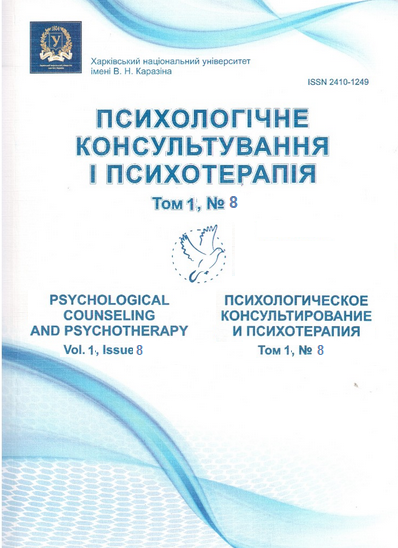System of relations of drug-dependent personality
Abstract
The paper discusses the basic psychological directions of the system of attitudes of drug addiction’s study. The analysis of the problem of the system of attitudes of drug addiction persons made it possible to consider the relationship of drug addicts as a triad of subject-subject attitude to the drug, subject-object attitude to other people and subject-object arritude to himself. Thus, the drug "humanizes", endowed with attributes of a person's mental life. Emotional attachment to the drug is "personalized," and its loss is experienced as the loss of some part of itself. Behavior in relation to the drug is manifested in his persistent search. While, another person is treated by drug addicts in terms of utility, acceptability, need, importance, importance for them. The result of the analysis of different points of view about the peculiarities of the system of attitudes among drug addicts was the construction of a model for studying the relationship of persons with drug addiction in the triad: the subject is a subjective attitude to the drug, the subject is the object relation to other people, and the subject is an objective relation to himself. Drug addicts, animate and personalize the drug, refer to it as a person. At the same time, their relation to other people and to themselves is reified, and others are perceived as objects for manipulation. The findings suggest that formation of subject-subject emotional stereotypes towards close women: mother and wife/girl who are based on the depreciation mother’s social status and further in exaggerating the negative qualities of a partner.
Downloads
References
Мясищев В. Н. Психология отношений: избранные психологические труды. М., 2003. 400 с.
Ломов Б. Ф. Методологические и теоретические проблемы психологии. М.: Наука, 1999. 350 с.
Змановская Е. В. Клинико-экспериментальное исследование объектных отношений пограничных пациентов // Вестник психоанализа. 2006. No 1-2. С. 91- 98.
Бодалев A. A. О психологическом понимании «Я» человека // Мир психологии - 2002 - №2 - С. 12-17.
Шабанов П.Д., Штакельберг О.Ю. Наркомании: патопсихология, клиника, реабилитация. СПб., 2001. - 367 с.
Березин С.В., Лисецкий К.С., Назаров Е.А. Психология наркотической зависимости и созависимости. Самара: Самарский университет, 2000.
Дунаевский В. В., Стяжкин В. Д. Наркомании и токсикомании. Л.: Медицина, 1990. - 206 с.
Кузнецова Л. Э., Хошаби К. Э. Система отношений личности как основа формирования психологической готовности к рождению ребенка // Молодой ученый. — 2015. — №9. — С. 1257-1259.
Гроф К., Гроф С. Неистовый поиск себя: Руководство по личностному росту через кризис трансформации: [Пер. с англ.]. - М.: Изд-во
Иващенко А. В. О дефинициях «Я», «Я-концепция» //Методологические и теоретические аспекты формирования и развития личности. - М.: Институт молодежи. - С. 48-52. // Мир психологии. - 2002. - № 2 (30). -с. 30
Горбатов С.В., Шелонина Т.В. Техника тематической апперцепции Э. Шнейдмана в изучении лиц с деструктивным поведением // Вестник СПбГУ, серия 12. 2011. Выпуск 2, С. 94-100.
Шелонина Т. В. Особенности системы отношений лиц с наркотической зависимостью / Татьяна Валериевна Шелонина. // Современные исследования социальных проблем (электронный научный журнал). – 2012. – С. 10.








